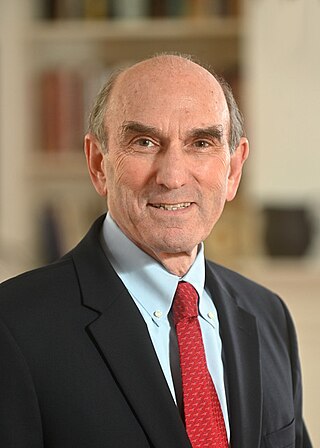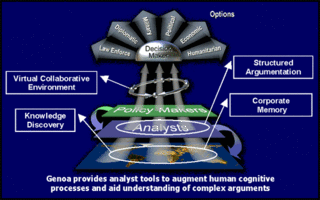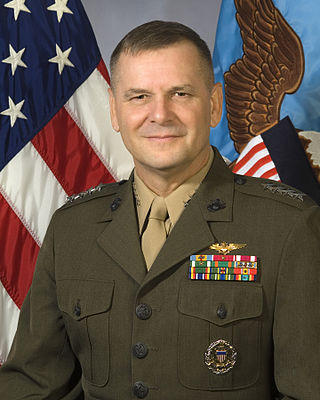
The Iran–Contra affair,often referred to as the Iran–Contra scandal and more rarely as the Iran Initiative,was a political scandal in the United States that occurred during the second term of the Reagan administration. Between 1981 and 1986,senior administration officials secretly facilitated the illegal sale of arms to Iran,which was subject to an arms embargo at the time. The administration hoped to use the proceeds of the arms sale to fund the Contras,an anti-Sandinista rebel group in Nicaragua. Under the Boland Amendment,further funding of the Contras by legislative appropriations was prohibited by Congress,but the Reagan administration figured out a loophole by secretively using non-appropriated funds instead.

The National War College (NWC) of the United States is a school in the National Defense University. It is housed in Roosevelt Hall on Fort Lesley J. McNair,Washington,D.C.,the third-oldest Army post still active.

The Information Awareness Office (IAO) was established by the United States Defense Advanced Research Projects Agency (DARPA) in January 2002 to bring together several DARPA projects focused on applying surveillance and information technology to track and monitor terrorists and other asymmetric threats to U.S. national security by achieving "Total Information Awareness" (TIA).

Caspar Willard Weinberger was an American politician and businessman. As a Republican,he served in a variety of state and federal positions for three decades,most notably as Secretary of Defense under President Ronald Reagan from January 1981 to November 1987. He was indicted on charges of lying to Congress and obstructing government investigations as part of the Iran–Contra investigation,but was pardoned by President George H. W. Bush before facing trial.

Total Information Awareness (TIA) was a mass detection program by the United States Information Awareness Office. It operated under this title from February to May 2003 before being renamed Terrorism Information Awareness.
The Boland Amendment is a term describing two U.S. legislative amendments between 1982 and 1984,both aimed at limiting U.S. government assistance to the Contras in Nicaragua. The first Boland Amendment was part of the House Appropriations Bill of 1982,which was attached as a rider to the Defense Appropriations Act of 1983,named for the Massachusetts Democrat,Representative Edward Boland,who authored it. The House of Representatives passed the Defense Appropriations Act 411–0 on December 8,1982,and it was signed by President Ronald Reagan on December 21,1982. The amendment outlawed U.S. assistance to the Contras for the purpose of overthrowing the communist Nicaraguan government,while allowing assistance for other purposes.

Elliott Abrams is an American politician and lawyer,who has served in foreign policy positions for presidents Ronald Reagan,George W. Bush,and Donald Trump. Abrams is considered to be a neoconservative. He is currently a senior fellow for Middle Eastern studies at the Council on Foreign Relations. He served as the U.S. Special Representative for Venezuela from 2019 to 2021 and as the U.S. Special Representative for Iran from 2020 to 2021.

Robert Carl "Bud" McFarlane was an American Marine Corps officer who served as National Security Advisor to President Ronald Reagan from 1983 to 1985. Within the Reagan administration,McFarlane was a leading architect of the Strategic Defense Initiative,a project intended to defend the US from Soviet ballistic missile attacks. He resigned as National Security Adviser in late 1985 because of disagreements with other administration figures but remained involved in negotiations with Iran and with Hezbollah.

David Manker Abshire served as a Special Counselor to President Ronald Reagan and was the United States Permanent Representative to NATO from 1983 to 1987. Abshire presided over the Center for the Study of the Presidency and Congress.

Project Genoa was a software project commissioned by the United States' DARPA which was designed to analyze large amounts of data and metadata to help human analysts counter terrorism.

James Edward "Hoss" Cartwright is a retired United States Marine Corps general who last served as the eighth vice chairman of the Joint Chiefs of Staff from August 31,2007,to August 3,2011. He previously served as the Commander,U.S. Strategic Command,from September 1,2004,to August 10,2007,and as Acting Commander,U.S. Strategic Command from July 9,2004,to September 1,2004. He retired from the Marine Corps on August 3,2011,after nearly 40 years of service.
The Tower Commission was a United States presidential commission established on December 1,1986,by President Ronald Reagan in response to the Iran–Contra affair. The commission,composed of former Senator John Tower of Texas,former Secretary of State Edmund Muskie,and former National Security Advisor Brent Scowcroft,was tasked with reviewing the proper role of the National Security Council staff in national security operations generally,and in the arms transfers to Iran specifically.
Donald R. Fortier was a member of the United States Intelligence Community.
The presidency of Ronald Reagan was marked by numerous scandals,resulting in the investigation,indictment or conviction of over 138 administration officials,the largest number for any president of the United States.

James Daniel Howard was Special Assistant to President of the United States Ronald Reagan from July 1986 to February 1988,United States Assistant Secretary of Defense for Public Affairs from February 1988 to May 1989 and Under Secretary of the Navy from 1989 to 1993.

Daniel K. Webb is an American lawyer and public official. He is the co-executive chairman of the international law firm of Winston &Strawn. He is a former United States Attorney for the Northern District of Illinois and previously served as the Special Counsel in the Iran-Contra affair. As the United States Attorney for the Northern District of Illinois,he was the top federal law enforcement official in the city of Chicago on behalf of the United States Department of Justice. As U.S. Attorney,Webb led Operation Greylord and successfully prosecuted 76 corrupt judges,police officers,court clerks,and lawyers.
Saffron Technology,Inc.,was a technology company headquartered in Cary,North Carolina,that developed cognitive computing systems. Their systems use incremental learning to understand and unify by entity the connections between an entity and other “things”in data,along with the context of their connections and their raw frequency counts. Saffron learns from all sources of data including structured and unstructured data to support knowledge-based decision making. Its patented technology captures the connections between data points at the entity level and stores these connections in an associative memory. Similarity algorithms and predictive analytics are then combined with the associative index to identify patterns in the data. Saffron’s Natural Intelligence platform was utilized across industries including manufacturing,energy,defense and healthcare,to help decision-makers manage risks,identify opportunities and anticipate future outcomes,thus reducing cost and increasing productivity. Its competitors include IBM Watson and Grok. Intel purchased the company in 2015,then shuttered it less than 3 years later.

Project Genoa II was a software project that originated with the United States Defense Advanced Research Projects Agency's Information Awareness Office and the successor to the Genoa program. Originally part of DARPA's wider Total Information Awareness project,it was later renamed Topsail and handed over to the Advanced Research and Development Activity for further development.
Poindexter is a Jèrriais surname most commonly found in the United States,but originally from the island of Jersey between Britain and France,where it survives in its original form of Poingdestre.
Bill Breeden is a retired Unitarian Universalist minister,former candidate for the Indiana House of Representatives,death penalty opponent,and civil activist. Breeden remains the only person connected to the Iran-Contra Affair who served jail time. His act of political protest is the subject of a 1994 documentary.














